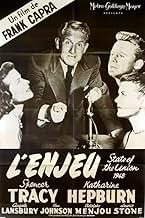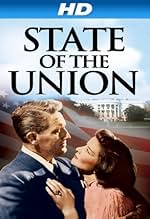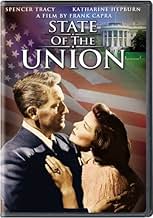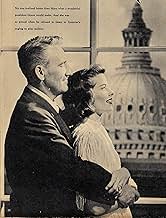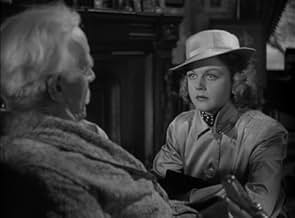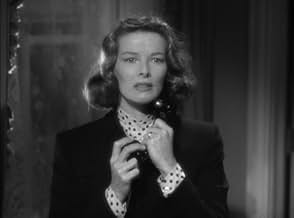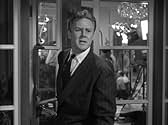AVALIAÇÃO DA IMDb
7,2/10
4,5 mil
SUA AVALIAÇÃO
Um industrial é instado a candidatar-se à presidência, mas isto requer compromissos desconfortáveis tanto a nível político como conjugal.Um industrial é instado a candidatar-se à presidência, mas isto requer compromissos desconfortáveis tanto a nível político como conjugal.Um industrial é instado a candidatar-se à presidência, mas isto requer compromissos desconfortáveis tanto a nível político como conjugal.
- Direção
- Roteiristas
- Artistas
- Prêmios
- 3 vitórias e 1 indicação no total
Georgie Nokes
- Grant Matthews Jr.
- (as George Nokes)
Avaliações em destaque
It's ironic that this is probably the least well-known of the Tracy/Hepburn collaborations--and yet, it's among their best as far as performances and overall content is concerned. Everyone, including KATHARINE HEPBURN and SPENCER TRACY, looks good in this film. VAN JOHNSON has one of his most engaging roles as the good guy who sees through the manipulations of corrupt ANGELA LANSBURY and ADOLPHE MENJOU.
And so, dirty politics is the theme of this film taken from the stage play by Howard Lindsey and Russel Crouse that starred RALPH BELLAMY and RUTH HUSSEY. Unfortunately, as directed by Frank Capra, it has a certain staginess about the proceedings with actors making entrances and exits as if on cue in rather static situations. But it's a pretty polished script and it's amusing to see the wonderful ANGELA LANSBURY (all of 23) playing a sophisticated woman in her 40s with such ease and perfection.
Spencer has a role tailor-made for his abilities, a man whose integrity is so challenged that he refuses to play by the rules of the game and play party politics. Hepburn, as the wife aware of his affair with Lansbury, is forthright and honest in her performance and, thankfully, less mannered than usual.
Still timely in the way it talks about Republicans and Democrats, it's worth seeing for the marvelous cast and what they manage to do with the stage material. The title, of course, refers to politics as well as the marital union of Tracy and Hepburn.
And so, dirty politics is the theme of this film taken from the stage play by Howard Lindsey and Russel Crouse that starred RALPH BELLAMY and RUTH HUSSEY. Unfortunately, as directed by Frank Capra, it has a certain staginess about the proceedings with actors making entrances and exits as if on cue in rather static situations. But it's a pretty polished script and it's amusing to see the wonderful ANGELA LANSBURY (all of 23) playing a sophisticated woman in her 40s with such ease and perfection.
Spencer has a role tailor-made for his abilities, a man whose integrity is so challenged that he refuses to play by the rules of the game and play party politics. Hepburn, as the wife aware of his affair with Lansbury, is forthright and honest in her performance and, thankfully, less mannered than usual.
Still timely in the way it talks about Republicans and Democrats, it's worth seeing for the marvelous cast and what they manage to do with the stage material. The title, of course, refers to politics as well as the marital union of Tracy and Hepburn.
This is an outstanding movie that belongs in the standard viewing repertoire of great movies from the 1940's. There is a reason this movie is not so well known. It was obviously filmed as a big MGM production (you can hear the lion's roar on the soundtrack!) that became owned by Frank Capra's Liberty Films. The script is very intelligent and demonstrates a knowing cynicism of the political world, but much more believable and less sentimental than Mr. Smith or other Capra films. Most people have seen only a few Tracy-Hepburn movies. Hopefully with Hepburn's recent passing the rights owner will produce a digitally restored DVD with background explaining the history and perspective of this seldom seen classic.
10stphifer
This is my favorite Tracy-Hepburn film and one of my favorite Frank Capra films. I recommend reading Capra's out-of-print biography, "The Name Above the Title" for the interesting story of the reaction to this film by official Washington in 1948.
Quite reminiscent of "Meet John Doe," the story tests the character of a man against the political power-brokers who want to use him for their own purposes. Ideals battle pragmatism in ways that still ring true 50+ years later.
Angela Landsbury is a wicked woman (can we call her a fem fa tale?) in an amazing performance foreshadowing her role in 1962's "Manchurian Candidate." Adolphe Menjou's sleazy political boss is about a greasy as they come.
All in all there is nothing like a Capra film to make me what to stick to my principles and listen to the people who really love me. Add to Capra's theme of the inherent wisdom of the people this first rate group of actors and you have two hours of time well spent.
Quite reminiscent of "Meet John Doe," the story tests the character of a man against the political power-brokers who want to use him for their own purposes. Ideals battle pragmatism in ways that still ring true 50+ years later.
Angela Landsbury is a wicked woman (can we call her a fem fa tale?) in an amazing performance foreshadowing her role in 1962's "Manchurian Candidate." Adolphe Menjou's sleazy political boss is about a greasy as they come.
All in all there is nothing like a Capra film to make me what to stick to my principles and listen to the people who really love me. Add to Capra's theme of the inherent wisdom of the people this first rate group of actors and you have two hours of time well spent.
In the 1980 New Hampshire primary, an exasperated Ronald Reagan blurted out the famous line "I'm paying for this microphone!" when a moderator threaten to turn off the microphones at an unruly debate. It was a hugely successful and defining moment for Reagan, nailing down his image as a man of rugged independence who refused to suffer fools gladly -- to say nothing of his ability to craft a clever quip. However, given his Hollywood roots, it seems more likely he consciously or unconsciously lifted this line from Spencer Tracy's character in "State of the Union."
`Is there any difference between Democrats and Republicans?' `The difference is that they're in and we're out.' -- A line from State of the Union, one of only a handful of political films to use direct partisan language.
Based on a 1945 play by Howard Lindsay and Russell Crouse, State of the Union marked Frank Capra's return to the political genera. This film is also the third of nine pictures featuring Spencer Tracey and Katharine Hepburn. In this outing, Tracey plays Grant Matthews, a famous aircraft tycoon courted by the Republican Party to become their candidate for President of the United States. The film's title, in addition to referring to the country, is also a metaphor for Matthews' relationship with his wife, Mary (Hepburn). The two are having marital problems sparked by Matthews' affair with a newspaper heir Kay Thorndyke (played by a 22-year-old Angela Lansbury convincingly portraying a woman in her forties).
Once the campaign is underway, the classic theme of a good man sacrificing his ideals in order to win begins to surface. Matthews' speeches are reworked as to not offend any big political establishments (e.g. big business, labor, agriculture, etc.), and soon he begins to loose his own voice along with his identity. Finally, in the film's climax, Matthews is forced to choose between a certain nomination for the presidency or a wife who represents his true character.
Incidentally, for a movie centered on a republican character, State of the Union does not focus on a conventional conservative theme, nor does it only target liberals. The film ribs big business, `the American Dream is not about making money,' in addition to labor. And even though Harry S Truman is the subject of several quips, he was said to have really enjoyed the film, often playing it on his presidential yacht.
At the box office, State of the Union performed better in smaller outlets than large markets. It premiered at New York's Radio City Music Hall to a opening week of $137,000, `this is a bit under hopes, especially in view of intensive advance campaign and strong reviews,' reported Varitey. In Los Angeles, the film opened at No. 1 with $52,000 but `not a smash.' Though in markets such as Minneapolis, Kansas City and Seattle, the film pulled big numbers. Overall the film was a success, but it did not match the box office bounty of Capra's earlier films including Mr. Smith Goes to Washington or the other Tracey/Hepburn parings for that matter (e.g. Adam's Rib, Pat & Mike, Guess Who's Coming to Dinner).
Based on a 1945 play by Howard Lindsay and Russell Crouse, State of the Union marked Frank Capra's return to the political genera. This film is also the third of nine pictures featuring Spencer Tracey and Katharine Hepburn. In this outing, Tracey plays Grant Matthews, a famous aircraft tycoon courted by the Republican Party to become their candidate for President of the United States. The film's title, in addition to referring to the country, is also a metaphor for Matthews' relationship with his wife, Mary (Hepburn). The two are having marital problems sparked by Matthews' affair with a newspaper heir Kay Thorndyke (played by a 22-year-old Angela Lansbury convincingly portraying a woman in her forties).
Once the campaign is underway, the classic theme of a good man sacrificing his ideals in order to win begins to surface. Matthews' speeches are reworked as to not offend any big political establishments (e.g. big business, labor, agriculture, etc.), and soon he begins to loose his own voice along with his identity. Finally, in the film's climax, Matthews is forced to choose between a certain nomination for the presidency or a wife who represents his true character.
Incidentally, for a movie centered on a republican character, State of the Union does not focus on a conventional conservative theme, nor does it only target liberals. The film ribs big business, `the American Dream is not about making money,' in addition to labor. And even though Harry S Truman is the subject of several quips, he was said to have really enjoyed the film, often playing it on his presidential yacht.
At the box office, State of the Union performed better in smaller outlets than large markets. It premiered at New York's Radio City Music Hall to a opening week of $137,000, `this is a bit under hopes, especially in view of intensive advance campaign and strong reviews,' reported Varitey. In Los Angeles, the film opened at No. 1 with $52,000 but `not a smash.' Though in markets such as Minneapolis, Kansas City and Seattle, the film pulled big numbers. Overall the film was a success, but it did not match the box office bounty of Capra's earlier films including Mr. Smith Goes to Washington or the other Tracey/Hepburn parings for that matter (e.g. Adam's Rib, Pat & Mike, Guess Who's Coming to Dinner).
Você sabia?
- CuriosidadesClaudette Colbert was originally cast to play Mary Matthews. A few days before production began, Producer and Director Frank Capra fired her from this movie because she refused to work into the evening. Capra then hired Katharine Hepburn on Spencer Tracy's suggestion.
- Erros de gravaçãoKatharine Hepburn's name is misspelled in the opening credits as "Katherine". This is the result of the original MGM opening credits (MGM was the original theatrical distributor) being replaced by haphazardly-designed replacement credits when MGM's distribution rights expired.
- Citações
Mary Matthews: Oh, that's silly. No woman could ever run for President. She'd have to admit she's over 35.
- Cenas durante ou pós-créditosWhen this film was reissued, new titles and credits were printed. The original end cast listing was retained, so the cast names which are misspelled in the reissue's opening credits are spelled correctly in the closing cast list.
- ConexõesFeatured in MGM: When the Lion Roars (1992)
Principais escolhas
Faça login para avaliar e ver a lista de recomendações personalizadas
Detalhes
- Data de lançamento
- País de origem
- Idioma
- Também conhecido como
- El Estado de la Unión
- Locações de filme
- Empresas de produção
- Consulte mais créditos da empresa na IMDbPro
Bilheteria
- Orçamento
- US$ 2.600.000 (estimativa)
- Tempo de duração
- 2 h 4 min(124 min)
- Cor
- Proporção
- 1.37 : 1
Contribua para esta página
Sugerir uma alteração ou adicionar conteúdo ausente



